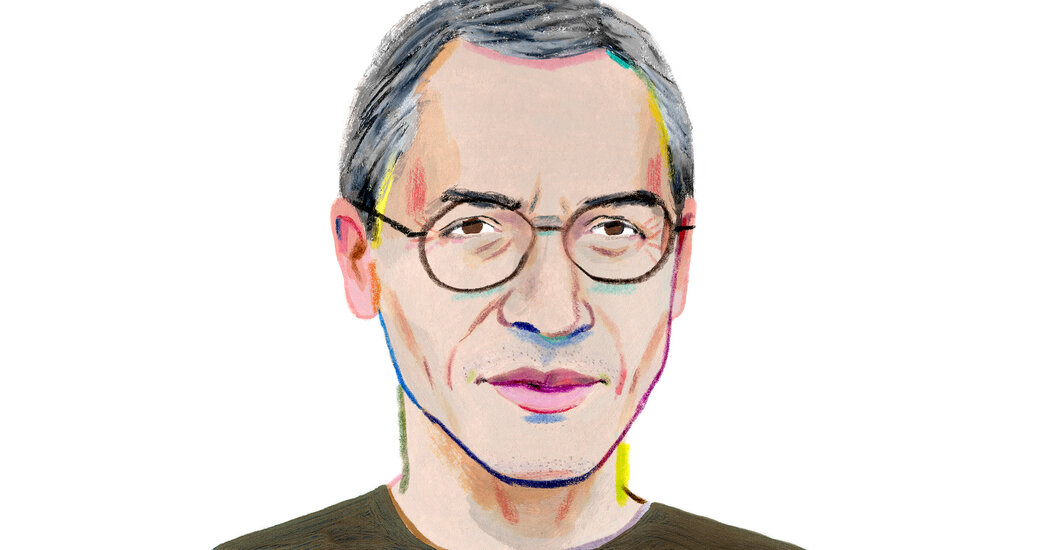In an email interview, the acclaimed creator of “Palestine” and “Safe Area Gorazde” admitted: “I’m a bit of a traitor to my own medium.” SCOTT HELLER
Describe your ideal reading experience.
Sitting in the backyard on a lawn chair with a vodka martini, four olives.
What’s the last great book you read?
Adania Shibli’s “Minor Detail.” A spare, powerful book about an obsessive search to uncover the facts of an obscure, hardly notable war crime. It caught me completely off guard.
Do you prefer books that reach you emotionally, or intellectually?
I tend to read nonfiction that is often dry and scholarly. I wish every academic could write as well as the historian Adam Hochschild, but they can’t or won’t let themselves. But even a woodenly written book, if it takes apart my preconceived notions, can emotionally unsettle me. I remember reading Noam Chomsky’s “The Fateful Triangle” and having to put it down every few pages to walk around and burn off my anger.
Do you count any books as guilty pleasures?
I feel guilty about reading comics or graphic novels. I’ve never shaken the notion that my time would be better spent reading prose. I’m a bit of a traitor to my own medium.
What books are on your night stand?
A couple of somewhat dueling books about the formulation of our political system, “The Radicalism of the American Revolution,” by Gordon S. Wood, and “Revolutionary America, 1763-1815,” by Francis D. Cogliano; Martha C. Nussbaum’s book on Indian sectarianism, “The Clash Within”; the second volume of Victor Klemperer’s astonishing diary, “I Will Bear Witness”; and “The Million Year Picnic,” a collection of comics drawn by Will Elder in the 1950s, because some guilty pleasures are definitely worth having, especially reading comics.
Do you draw or write to music? What kind?
I need silence to write, but I couldn’t draw without music. Something unobtrusive but interesting like Brian Eno’s ambient work when I’m penciling or lettering, but anything goes when I’m inking, depending on my mood — Waylon Jennings, John Coltrane, Neu!, Devo, Howlin’ Wolf, the Stones, and for some reason, over and over, “Beatles for Sale.”
Explain the meaning of “future” in the title of “The Once and Future Riot.”
When I’m feeling particularly ungenerous, which is often, I think our electoral regimes have devolved into frameworks amenable to politicians who stoke fear and manufacture enemies to secure votes. This phenomenon has become so normalized that ordinary people have begun to reflect the sociopathologies of the leadership class. The result is what one person I met in India termed “election-time fury.” Unfortunately, violence and elections seem well suited, and I fear this will become only more apparent as the democratic spirit fades away — thus the “future riot.”
You told The Comics Journal that this would be your last piece of journalism. Why are you moving on?
Reporting is the easy and often the exciting part, but over the years drawing human suffering realistically has become more difficult and unpleasant. I need other ways of approaching the same subjects that are a little less visceral.
What then comes next?
I have been working on a philosophical book about the Rolling Stones for more than a decade. It’s a self-conscious throwback to the American underground comix of the 1960s and 1970s. I guarantee it will be the greatest thing produced by anyone ever, or at least that’s what the blurbs will say.
You’ve been writing about Gaza for decades. Will you be able to put that behind you at this point in time?
Of course, I immediately broke my promise to stop doing journalism. I’m working with my friend, the journalist Chris Hedges, on a book about Gaza. There is no possible way I can ignore a genocide going on in a place where I spent a good amount of time and made friends, especially when — as someone paying for the bombs through my taxes — I am personally implicated in the horror.
Who is your favorite fictional hero or heroine?
Even though I’m more a Rousseau man, my favorite fictional character is the product of Voltaire’s pen: Candide. Candide is not particularly savvy, but his adventures are some of the funniest things I’ve ever read.
Your favorite antihero or villain?
The fictional villain I despise the most is the Antichrist in the Book of Revelation, which, unlike some people, I definitely consider a piece of fiction, one I wish had never been tacked on to the New Testament.
How do you sign books for your fans?
I enjoy meeting people at signings, and I like to get at least some sense of the person in front of me, so I draw a dopey self-portrait while we’re talking just to extend our time together. Otherwise, signings feel a bit too much like an assembly line.
You’re organizing a literary dinner party. Which three writers, dead or alive, do you invite?
Aldous Huxley, George Orwell and Philip K. Dick. For obvious reasons.
The post Joe Sacco Thought He Was Done With Comics Journalism appeared first on New York Times.




